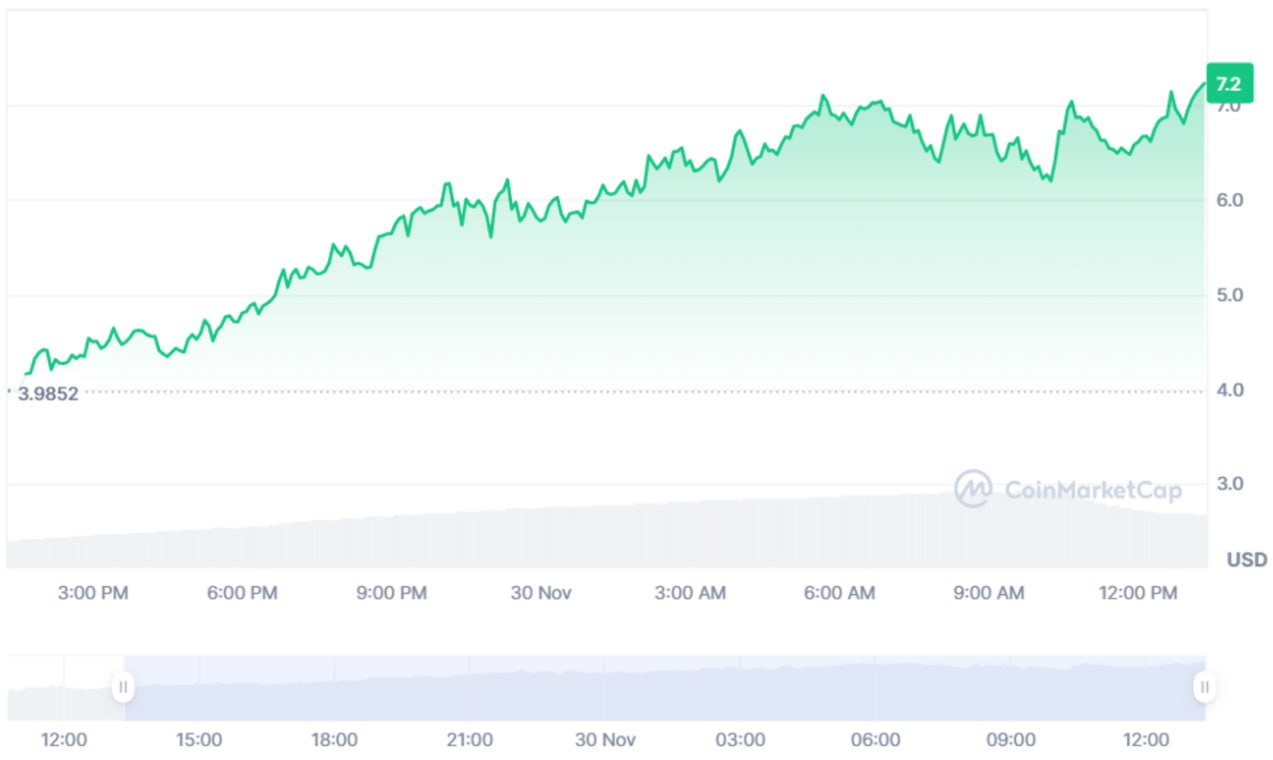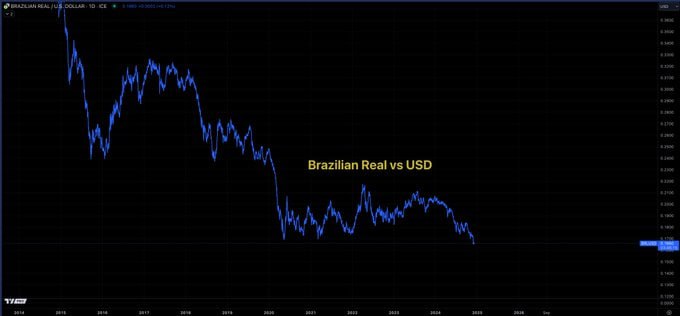Airdrop of hype tokens, Brazil's crypto reserves, and other news of the week
The Hype coins were distributed among users, another country is preparing to accumulate bitcoin reserves, and yet another conspiracy theory has been debunked – we discuss the most interesting events in the crypto market over the past week.
The most hype airdrop of the year
On November 29, users of the decentralized exchange Hyperliquid discovered native HYPE tokens in their wallets. The platform distributed coins worth $2 billion – one of the most generous airdrops of the year.

The coin's price quickly surged. Within half a day, it rose nearly one and a half times – from $3.2 to $7.2. Investors are impressed:
“ONE MILLION COLD HARD UNITED STATES DOLLARS FOR 1 HYPERLIQUID AIRDROP
@chameleon_jeff, @KingJulianIAm and the rest of the Hyperliquid team changed my life FOREVER:
Eternal bliss - forever grateful”, - the airdrop expert CC2 shared his success.(@CC2Ventures)

“hyperliquid ( $HYPE ) at $1.8B marketcap already
they airdropped 30% to users
this means they literally just paid out $600,000,000 USD to a bunch of guys who were early users of the platform
I've never seen anything with as much opportunity as crypto, it's not even close”, - says crypto trader Danile. (@danielgothits)
"It's been ~24 hours since Hyperliquid's TGE and we have ran through 1/3 of the HYPE salt sheet already.
Over $2b of magic internet money was printed today, making it the largest day 1 crypto airdrop ever. Buckle up, the next few months are going to be wild...",- noted Crypto trader Stevent.(@stevenyuntcap)
Brazil plans to create a national bitcoin reserve
Brazilian Deputy Eros Biondini proposed that the government spend a portion of the national reserve to purchase bitcoins. The idea was presented as a bill, stating that $18.5 billion, or 5% of the national reserve, should be allocated for cryptocurrency acquisition. This would help protect Brazil's state budget from currency fluctuations and geopolitical threats.
Biondini may have been inspired by U.S. President-elect Donald Trump, as the creation of a bitcoin reserve was part of the Republican's successful election program. Analysts expect similar initiatives to emerge in other countries.
“Brazil lawmaker proposes $18 BILLION #Bitcoin Sovereign Reserve.
180,000 $BTC
First they fight you. Then they join you”, - says investor Jason A. Willimas. (@GoingParabolic).
“Brazil is in panic mode. The #Brazilian Real has collapsed to an all-time low against the U.S. Dollar. They are accumulating #Bitcoin to protect their wealth and save their currency. Watch for other nations to replicate”, - considers macro analyst Mike Party. (@martypartymusic)

Hooray! It seems we don't live in a simulation after all
We live in the real world. At least, according to Robert Leshner's theory.
The head of the tokenized asset management company Superstate formulated the conditions under which life is recognized as a computer simulation: on November 28, bitcoin was supposed to reach a price of $100,000. The token fell short at $99,377.
Leshner noted that bitcoin previously hit the $1,000 mark on November 28, 2013, and then rose to $10,000 on November 28, 2017. In his view, crossing the next psychological barrier precisely on November 28 of this year was also expected to reinforce this theory.
Leshner noted that bitcoin previously hit the $1,000 mark on November 28, 2013, and then rose to $10,000 on November 28, 2017. In his view, crossing the next psychological barrier precisely on November 28 of this year was also expected to reinforce this theory.
“Bitcoin broke 1,000 on November 28Bitcoin broke 10,000 on November 28
Bitcoin has a chance to break 100,000 on November 28
I don’t believe in Simulation Theory, but if it happens that would convince me”, - CEO of superstatefunds Robert Leshner. (@rleshner)
The hypothesis of the existence of a computer simulation was proposed by Swedish philosopher Nick Bostrom in 2003. He suggested that powerful computing technologies and nanotechnology could recreate natural objects and the activities of living beings. Similar themes have appeared among other scientists and philosophers, as well as in pop culture (for example, in the iconic franchise "The Matrix").
The idea has been further developed by other philosophers, psychologists, and influencers. In 2016, Elon Musk added intrigue by publicly expressing his doubts about the reality of our world.
And although this time the theory did not hold up, bitcoin still has growth potential and many other psychological thresholds, so we await the next November 28.

